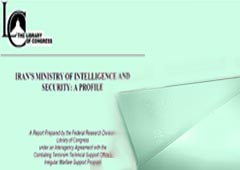A US Library of Congress report asserting that Iran’s Intelligence agency has 30,000 employees has been widely quoted – and criticized. The report has been withdrawn and is now under  revision.
revision.
An official with the Library of Congress says a widely cited but poorly sourced report his office did on Iran’s intelligence ministry has been pulled from circulation.
As we detailed last week, the study’s ill-supported claim that the Iranian intelligence ministry has 30,000 employees was picked up by CNN and others. News outlets have also seized on other assertions in the report.
The report, which was produced on behalf of a Pentagon office, had been posted on a non-public government-only website. It was leaked earlier this month.
"The report was pulled for revisions after the Division staff identified a passage that should have been caveated but was missed in the initial reviews," said Federal Research Division chief David Osborne in an email. "The report will be re-posted when revised."
Osborne declined to specify the passage in question. It might have had nothing to do with the 30,000 figure.
Another section of the report prompted a married couple branded as spies for Iran to consider legal action.
The report flatly claims that a British woman and her Iranian-born husband are operatives for Iran’s intelligence ministry. The husband, Massoud Khodabandeh, is a former-member-turned-fierce-critic of the Mujahadin-e Khalq (MEK), a small exile group that has long fought the government of Iran and was recently removed from the U.S. government’s list of terrorist organizations.
The report even includes their pictures.
The report’s source for the spy claim is a 2007 essay published on a now-defunct website by Rabbi Daniel Zucker, who is chair of a group called Americans for Democracy in the Middle East and has frequently written in support of the MEK.
The Zucker piece in turn cites a 2005 post on another now-defunct pro-MEK website called iranterror.com. That site also states Khodabandeh and his wife are operatives for Iranian intelligence, but does not offer any sources or evidence.
Even though it relied on questionable sourcing, the report effectively extended the imprimatur of the U.S. government to the claim that the couple are spies.
Asked about the various criticisms of the report, Pentagon spokeswoman Anne Edgecomb told ProPublica: "We believe its findings will enrich the discussions and concepts of policy makers."
She declined to comment further.
The MEK’s official website seized on the government report this month, publishing an item claiming that "a recent investigative report by [the] Pentagon … revealed that Anne and Massoud Khodabandeh are agents of the mullahs’ Ministry of Intelligence and Security."
Khodabandeh and his wife, Anne, who also worked with the MEK in the 1980s and 90s, were incensed by the government report.
"Everything they’ve said is just made up," Anne Khodabandeh told ProPublica.
Massoud Khodabandeh wrote a response column on Huffington Post blasting the report for its reliance on pro-MEK sources. The couple, who are based in the United Kingdom, run an anti-MEK website and consider the group a dangerous cult. (That charge that has been echoed by some outside observers but rejected by the MEK.)
The study claims that after Khodabandeh left the MEK in 1996, he and Anne "agreed to work for [Iran’s intelligence ministry] and spy on MEK." It claims that the intelligence ministry used threats against Khodabandeh’s family in Tehran to compel the couple to cooperate.
Earlier this month, Anne Khodabandeh emailed Osborne, the Federal Research Division chief, saying that "my solicitor would like to know the actual provenance of the report for further action." Osborne responded that the report had been pulled down for (again unspecified) revisions.
"The fact that the document was leaked to [Washington Free Beacon reporter] Mr. Bill Gertz or otherwise publicized is not the fault of the Library of Congress," Osborne wrote Jan. 9. "It is not and will not be posted to any Library of Congress site."
Anne Khodabandeh told ProPublica she and her husband are holding off on legal action at this point because of the potential expense involved, and the fact that the report does not name its author.
Justin Elliott,

